Suchergebnisse
VisErgyControl - Integral control system for daylight and artificial lighting for high visual and melanopic comfort with minimized primary energy consumption
Within the project VisErgyControl an integral, simulation-based, energy-efficient open loop daylight and artificial lighting control system had been developed. The research project focuses on the visual and melanopic requirements of users while minimizing the energy consumption for heating and cooling.
Datenkreis Energiewirtschaft
Die Dekarbonisierung des Energiesystems und innovative Dienstleistungen können durch die Verfügbarkeit und sektorübergreifende Weitergabe von Daten unterstützt werden.
Energiemosaik Austria - Österreichweite Modellierung und webbasierte Visualisierung von Energieverbrauch und CO2-Emissionen auf Gemeindeebene
Inhalt des Projektes ist eine alle Nutzungs- und Mobilitätsarten umfassende Modellierung und webbasierte Visualisierung von Energieverbrauch und Treibhausgasemissionen aller österreichischen Gemeinden. Die Ergebnisse können in zahlreiche energie- und klimarelevante Handlungsfelder integriert und für die Sensibilisierung von Entscheidungsträgern und Öffentlichkeit genutzt werden.
Energy Mosaic Austria - Austrianwide modelling and web-based visualisation of energy consumption and greenhouse gas emissions on local level
The project consists of a modelling and a web-based visualisation of energy consumption and greenhouse gas emissions of all Austrian cities and municipalities considering all kinds of land use and mobility. The results deliver a sound basis for numerous energy and climate relevant fields of action and for awareness raising of decision makers and the public.
P2PQ - Peer2Peer im Quartier
Das Projekt Peer2Peer im Quartier befasst sich mit der konkreten Umsetzung von Anwendungen zu Photovoltaik-Eigenverbrauchsoptimierung sowie Peer-to-Peer-Beziehungen auf Basis der Blockchain-Technologie in Quartieren und deren Validierung im Echtbetrieb.
P2PQ - Peer2Peer im Quartier
The research project Peer2Peer im Quartier deals with applications optimizing the selfconsumption of PV-generated energy within urban quarters by enabling peer-to-peer relations among energy prosumers based on Blockchains. Aim is to develop and validate these applications in real operation.
Methoden- und Konzeptentwicklung zur Implementierung nachhaltiger Energiesysteme in Städten am Beispiel von Gleisdorf und Salzburg (ECC - EnergyCityConcepts)
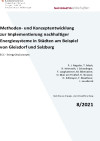
Im gegenständlichen Projektvorhaben werden anhand zweier konkreter Modellregionen (Kleinstadt Gleisdorf und urbanes Stadtquartier Salzburg-Schallmoos) neue methodische Herangehensweisen (interdisziplinäre Energieraumplanung, Modellbildung und Simulation) entwickelt und erprobt. Die beiden Modellregionen verbindet dabei das ambitionierte politische Bekenntnis zu einer 100 % erneuerbaren bzw. CO2-neutralen Energieversorgung.
Schriftenreihe
8/2021
P. J. Nageler, T. Mach, R. Heimrath, I. Schardinger, F. Langhammer, M. Biberacher, O. Mair am Tinkhof, H. Strasser, H. Edtmayer, F. Mauthner, I. Leusbrock
Herausgeber: BMK
Deutsch, 141 Seiten
Downloads zur Publikation
Monitoring Mehrfamilienhäuser "Tonpfeifengasse"
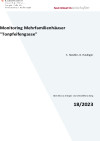
Messtechnische Begleitung und Bewertung der Funktionsweise von Bauteilaktivierung als Speicher für Umweltenergien am Beispiel der Wohnhausanlage Tonpfeiffengasse.
Schriftenreihe
18/2023
S. Handler, G. Haslinger
Herausgeber: BMK
Deutsch, 72 Seiten
Downloads zur Publikation
Digital technologies
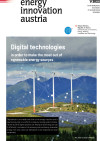
Digital technologies in order to make the most out of renewable energy sources.
energy innovation austria
1/2022
Herausgeber: BMK in cooperation with the Climate and Energy Fund
Englisch, 12 Seiten
Downloads zur Publikation
Monitoring of multi-family houses “Tonpfeifengasse”
Evaluation of activated building parts as heat storage for renewable energy shown on the example of the multi-family houses "Tonpfeifengasse".
Langzeitevaluierung des Energieverbrauchs von 100 energieeffizienten Gebäuden in Österreich als repräsentativer Querschnitt österreichischer Leuchtturmobjekte (LZE 100 Leuchtturmobjekte)
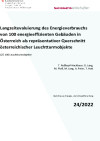
Erfassung, Auswertung und Analyse von Energieverbrauchsdaten von 100 energieeffizienten Gebäuden in Österreich über eine Betriebszeit von 3 bis 25 Jahren als repräsentativer Querschnitt der österreichischen Leuchtturmobjekte. Differenzierung nach Gebäudetypen, Energieträger und Ermittlung der realen Treibhausgas-Emissionen. Vergleich der gemessenen Verbräuche zu Benchmark-Werten.
Schriftenreihe
24/2022
T. Roßkopf-Nachbaur, G. Lang, M. Ploß, M. Lang, A. Peter, T. Hatt
Herausgeber: BMK
Deutsch, 143 Seiten
Downloads zur Publikation
Energiemosaik Austria - Österreichweite Modellierung und webbasierte Visualisierung von Energieverbrauch und CO2-Emissionen auf Gemeindeebene
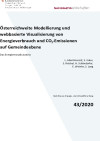
Inhalt des Projektes ist eine alle Nutzungs- und Mobilitätsarten umfassende Modellierung und webbasierte Visualisierung von Energieverbrauch und Treibhausgasemissionen aller österreichischen Gemeinden. Die Ergebnisse können in zahlreiche energie- und klimarelevante Handlungsfelder integriert und für die Sensibilisierung von Entscheidungsträgern und Öffentlichkeit genutzt werden.
Schriftenreihe
43/2020
L. Abart-Heriszt, S. Erker, S. Reichel, H. Schöndorfer, E. Weinke, S. Lang
Herausgeber: BMK
Deutsch, 56 Seiten
Downloads zur Publikation
Energy-Sponge-Bruck (Energieschwamm Bruck an der Mur)
The aim of the exploration-study for the urban region Bruck/Oberaich "Energieschwamm Bruck" or "Energy-Sponge-Bruck" was to establish clear and stringent basics for a flexible development of the future energy system. Therefore an energy development concept as well as a cadaster for short-term implementation measures had been applied. The structured, Bruck-based approach acts as framework for a general energy-conception-method, valid for small and medium urban regions with 10,000 to 20,000 inhabitants.
Ergebnisband „Urban Data Management“
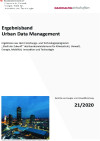
Der vorliegende Ergebnisband stellt abgeschlossene Projekte aus dem Forschungs- und Technologieprogramm „Stadt der Zukunft“ des Bundesministeriums für Klimaschutz, Umwelt, Energie, Mobilität, Innovation und Technologie (BMK) im Bereich Urban Data Management vor. Die gewonnenen Erkenntnisse sollen eine Entwicklung in Richtung energieeffiziente und klimaverträgliche Stadt unterstützen, die auch dazu beiträgt, die Lebensqualität und die wirtschaftliche Standortattraktivität zu erhöhen.
Schriftenreihe
21/2020
Redaktionelle Gestaltung: Bianca Pfefferer, Hannes Warmuth (ÖGUT)
Herausgeber: BMK
Deutsch, 24 Seiten
Downloads zur Publikation
Ergebnisband „Klimaneutrale Städte"
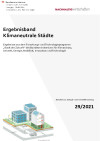
Der vorliegende Ergebnisband stellt abgeschlossene Projekte aus dem Forschungs- und Technologieprogramm „Stadt der Zukunft“ des Bundesministeriums für Klimaschutz, Umwelt, Energie, Mobilität, Innovation und Technologie (BMK) im Bereich Klimaneutrale Städte vor. Die gewonnenen Erkenntnisse sollen eine Entwicklung in Richtung energieeffiziente und klimaverträgliche Stadt unterstützen, die auch dazu beiträgt, die Lebensqualität und die wirtschaftliche Standortattraktivität zu erhöhen.
Schriftenreihe
29/2021
Redaktionelle Gestaltung: Bianca Pfefferer, Hannes Warmuth (ÖGUT)
Herausgeber: BMK
Deutsch, 22 Seiten
Downloads zur Publikation
LINE-FEED - Plug-in Photovoltaik-Speicher für die Steckdose
Im Projekt LINE-FEED wurden Technologien entwickelt, die für einen Photovoltaik-Speicher benötigt werden, der von jedem Laien an einer gewöhnlichen Steckdose angeschlossen werden kann. Ziel war die Entwicklung eines Speichersystems für Haushalte in urbanen Räumen, welche selbst keine Möglichkeit der Installation einer Photovoltaikanlage haben.
LINE-FEED - Plug-in Photovoltaic Storage for the Wall Socket
The project LINE-FEED developed technologies that are required for a photovoltaic storage system which can be installed by anybody by simply plugging it into a wall socket. The aim was to create a storage system for households in urban areas that do not have the possibility to install a photovoltaic system themselves.
Ergebnisband „Urbane Wärme und Kälte“
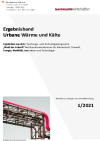
Der vorliegende Ergebnisband stellt abgeschlossene Projekte aus dem Forschungs- und Technologieprogramm „Stadt der Zukunft“ des Bundesministeriums für Klimaschutz, Umwelt, Energie, Mobilität, Innovation und Technologie (BMK) im Bereich Urbane Wärme und Kälte vor. Die gewonnenen Erkenntnisse sollen eine Entwicklung in Richtung energieeffiziente und klimaverträgliche Stadt unterstützen, die auch dazu beiträgt, die Lebensqualität und die wirtschaftliche Standortattraktivität zu erhöhen.
Schriftenreihe
1/2021
Redaktionelle Gestaltung: Bianca Pfefferer, Hannes Warmuth (ÖGUT)
Herausgeber: BMK
Deutsch, 24 Seiten
Downloads zur Publikation
SmallWindPower@Home - Evaluierung der Auswirkungen von gebäudemontierten Kleinwindenergieanlagen auf Performance, Personen, Gebäude und Umgebung
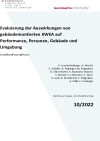
Im Projekt „SmallWindPower@Home“ erfolgte eine messtechnische Evaluierung der Auswirkungen von komplexen Hindernissen auf die Anströmung und Performance unterschiedlicher gebäudemontierter Kleinwindenergieanlagen (KWEA). Darüber hinaus wurden deren Auswirkungen auf das Gebäude, dessen Bewohner und die unmittelbare Umgebung untersucht.
Schriftenreihe
10/2022
K.Leonhartsberger, A. Hirschl,S.Schidler, B. Priglinger, M. Peppoloni,D.Österreicher, K. Baumann-Stanzer,S.Stenzel, C. Lotteraner, T. Duer,K.Leeb, K. Strohkendl, C. Tiefgraber,A.Stökl, F. Lachinger
Herausgeber: BMK
Deutsch, 166 Seiten
Downloads zur Publikation
BIMaterial Process Design for Material Building Pass
Building Information Modelling supported compilation of a Material Building Pass; as a qualitative and quantitative documentation of the material composition of, and the material distribution within, a building structure. This project is a central milestone towards standardized, BIM-generated building material passes.
